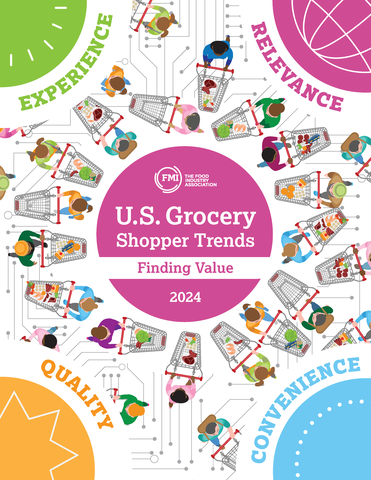Financial News
FMI Launches 2024 U.S. Grocery Shopper Trends Series: How Consumers Are Finding Value at the Grocery Store
Consumers Maintain a Positive View of Food Shopping, Simplifying their Store Mix
Shoppers enjoy food shopping as much as ever, according to the latest annual survey by FMI – The Food Industry Association, conducted by The Hartman Group. The analysis kicking off this 2024 series, U.S. Grocery Shopper Trends: Finding Value, provides a crucial snapshot of consumer behavior and sentiment in the most frequently purchased consumer category amid ongoing concerns about the impact of inflation on the cost of groceries.
This press release features multimedia. View the full release here: https://www.businesswire.com/news/home/20240514647118/en/

Shoppers enjoy food shopping as much as ever, according to the U.S. Grocery Shopper Trends report by FMI – The Food Industry Association. (Photo: Business Wire)
While consumer concerns about food inflation persist, FMI’s newly launched U.S. Grocery Shopper Sentiment Index, which accounts for shoppers’ collective feelings and attitudes toward grocery shopping as well as their feelings about their current primary store, found that grocery shopper sentiment reached a post-COVID-19 pandemic high in 2023 (of 72 out of 100) and continues to remain elevated (70 out of 100 currently), with more than half of shoppers surveyed expressing positive feelings toward grocery shopping. This strong score, achieved at the virtual peak of price inflation, suggests that notwithstanding the difficulties price inflation may introduce, it has done little to degrade the overall experience and outcomes perceived in grocery shopping.
“FMI's national survey found that grocery shoppers’ concerns about inflation have stabilized in recent months, illustrating how resilient consumers are when it comes to food shopping,” said Leslie G. Sarasin, president and CEO of FMI. “To manage higher prices, shoppers are increasingly prioritizing getting good value, which involves focusing more on quality and optimizing purchases for personal enjoyment, convenience, and waste-reduction at home.”
Sarasin continued, "This is not to say that price is irrelevant to the value equation – 91% of shoppers concerned with rising prices have made some changes to their shopping habits to achieve better price value. While half of shoppers surveyed say they are looking for more deals, only 32% are buying fewer items and far fewer are cutting back on key food categories or attributes such as organic (15%) or fresh items (14%).”
FMI's grocery trends exploration partner, and CEO of The Hartman Group, Laurie Demeritt, said, "Ultimately, food shopping remains a labor of like – if not always a labor of love. However, how much shoppers like or love grocery shopping does vary between different demographics. For example, Millennials and Gen Z say they 'love' or 'like' grocery shopping more than Gen X or Baby Boomers do. The research shows that where and how consumers shop for food also differs depending on age – it’s not just that younger shoppers have more comfort with online grocery, younger shoppers are more likely to have shifted their trips away from supermarkets and toward mass and other channels."
FMI’s U.S. Grocery Shopper Trends survey also revealed:
- Supermarkets Lead Amid Store Mix: Despite a decade-long trend toward mass retailers, 40% of shoppers now choose supermarkets as their main store, compared to 32% opting for mass stores.
- Online Grocery Shopping Frequency Returns to Pre-Pandemic Levels: Occasional online shopping rose from 49% to 67%. However, frequent online shopping peaked during the COVID-19 pandemic and has since declined to pre-pandemic levels.
- Rise in Digital Tools for Smart Shopping: While online grocery growth has slowed, shoppers increasingly value digital touchpoints. Fifty percent of shoppers use digital coupons, surpassing the 37% who use physical coupons. Additionally, 37% of grocery shoppers now use their mobile phones to compare prices across stores, a 28-point increase from 2016.
- Americans continue to say they enjoy cooking, but while workday meals are increasingly sourced from home, shoppers spend less and less time on dinner prep (32% under 30 minutes, up from 18% in February of 2020).
- Eating & Cooking Trends: While nutrition objectives have remained consistent for grocery shoppers as a whole, individual shoppers continue to explore and experiment with eating approaches and scrutinize labels for different claims as they age.
For Media:
- Members of the media may contact FMI for a gratis copy of the U.S. Grocery Shopper Trends 2024: Finding Value report. In addition to this report, FMI released reports on Online Shopping and Eating & Cooking. These reports are part of a five-part U.S. Grocery Shopper Trends series this year. Learn more and find related resources at www.FMI.org/GroceryTrends.
About FMI
As The Food Industry Association, FMI works with and on behalf of the entire industry to advance a safer, healthier, and more efficient consumer food supply chain. FMI brings together a wide range of members across the value chain — from retailers to producers to companies supplying critical services — to amplify the collective work of the industry. www.FMI.org
View source version on businesswire.com: https://www.businesswire.com/news/home/20240514647118/en/
Contacts
Heather Garlich, media@fmi.org, 202-220-0616
More News
View More





Quotes delayed at least 20 minutes.
By accessing this page, you agree to the following
Privacy Policy and Terms Of Service.



